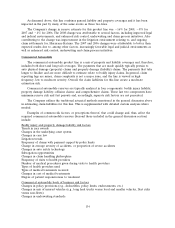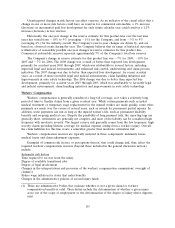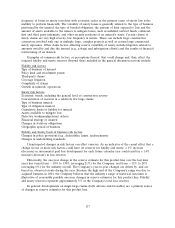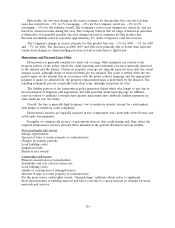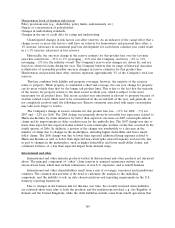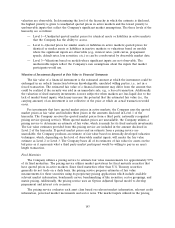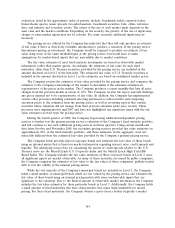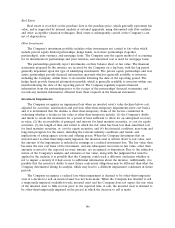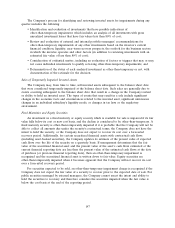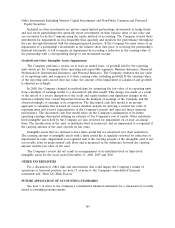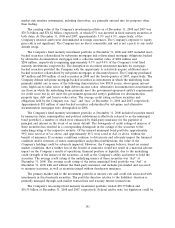Travelers 2008 Annual Report Download - page 156
Download and view the complete annual report
Please find page 156 of the 2008 Travelers annual report below. You can navigate through the pages in the report by either clicking on the pages listed below, or by using the keyword search tool below to find specific information within the annual report.evaluation, listed in the approximate order of priority, include: benchmark yields, reported trades,
broker/dealer quotes, issuer spreads, two-sided markets, benchmark securities, bids, offers, reference
data, and industry and economic events. The extent of the use of each market input depends on the
asset class and the market conditions. Depending on the security, the priority of the use of inputs may
change or some market inputs may not be relevant. For some securities additional inputs may be
necessary.
The pricing service utilized by the Company has indicated that they will only produce an estimate
of fair value if there is objectively verifiable information to produce a valuation. If the pricing service
discontinues pricing an investment, the Company would be required to produce an estimate of fair
value using some of the same methodologies as the pricing service, but would have to make
assumptions for market-based inputs that are unavailable due to market conditions.
The fair value estimates of most fixed maturity investments are based on observable market
information rather than market quotes. Accordingly, the estimates of fair value for such fixed
maturities, other than U.S. Treasury securities, provided by the pricing service are included in the
amount disclosed in Level 2 of the hierarchy. The estimated fair value of U.S. Treasury securities is
included in the amount disclosed in Level 1 as the estimates are based on unadjusted market prices.
The Company reviews the estimates of fair value provided by the pricing service and compares the
estimates to the Company’s knowledge of the market to determine if the estimates obtained are
representative of the prices in the market. The Company produces a report monthly that lists all price
changes from the previous month in excess of 10%. The Company reviews the report and will challenge
any prices deemed not to be representative of fair value. In addition, the Company has implemented
various other processes including randomly selecting purchased or sold securities and comparing
execution prices to the estimates from the pricing service as well as reviewing reports that contain
securities whose valuation did not change from their previous valuation (stale price review). These
processes were implemented in mid-2007 and have not highlighted any significant issues with the fair
value estimates received from the pricing service.
During the fourth quarter of 2008, the Company began using additional independent pricing
services to further test the primary pricing service’s valuation of the Company’s fixed maturity portfolio,
and will continue to use such additional pricing services in future quarters. Using certain month-end
data from October and November 2008, the secondary pricing services provided fair value estimates on
approximately 98% of the fixed maturity portfolio, and those estimates, in the aggregate, were not
materially different than the estimated fair value provided by the Company’s primary pricing service.
The Company holds privately placed corporate bonds and estimates the fair value of these bonds
using an internal matrix that is based on market information regarding interest rates, credit spreads and
liquidity. The underlying source data for calculating the matrix of credit spreads relative to the U.S.
Treasury curve are the Merrill Lynch U.S. Corporate Index and the Merrill Lynch High Yield BB
Rated Index. The Company includes the fair value estimates of these corporate bonds in Level 2, since
all significant inputs are market observable. As many of these securities are issued by public companies,
the Company compares the estimates of fair value to the fair values of these companies’ publicly traded
debt to test the validity of the internal pricing matrix.
While the vast majority of the Company’s municipal bonds are included in Level 2, the Company
holds a small number of municipal bonds which are not valued by the pricing service and estimates the
fair value of these bonds using an internal pricing matrix with some unobservable inputs that are
significant to the valuation. Due to the limited amount of observable market information, the Company
includes the fair value estimates for these particular bonds in Level 3. Additionally, the Company holds
a small amount of fixed maturities that have characteristics that make them unsuitable for matrix
pricing. For these fixed maturities, the Company obtains a quote from a broker (typically a market
144


